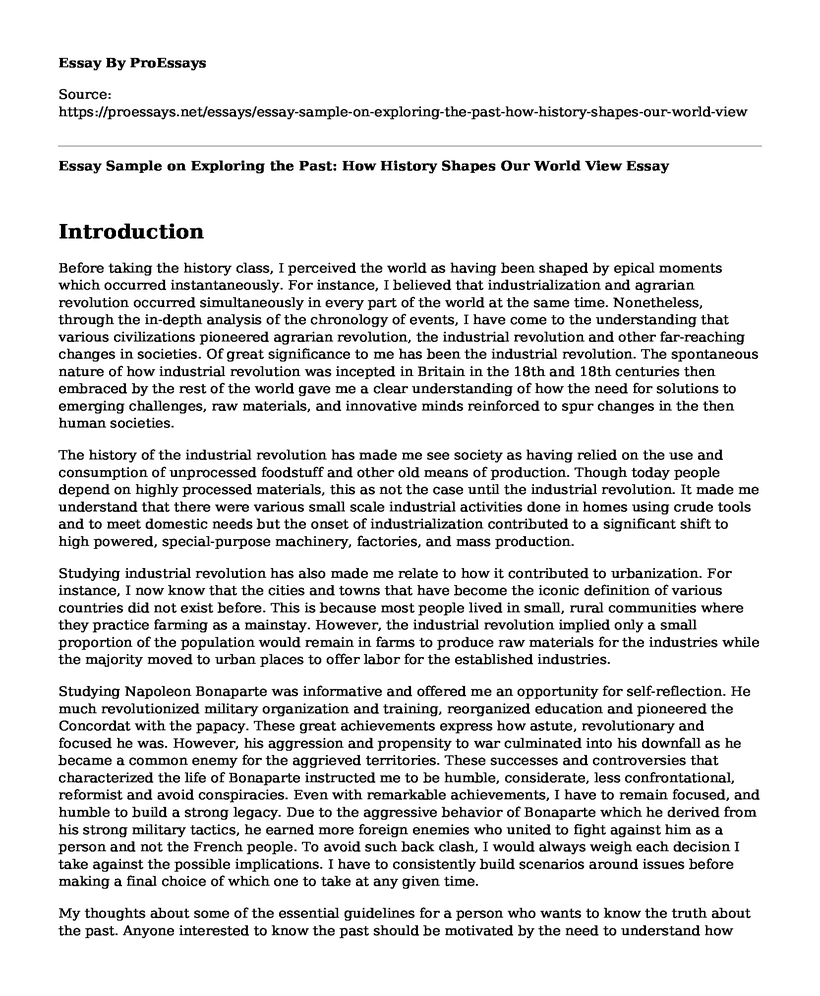Introduction
Before taking the history class, I perceived the world as having been shaped by epical moments which occurred instantaneously. For instance, I believed that industrialization and agrarian revolution occurred simultaneously in every part of the world at the same time. Nonetheless, through the in-depth analysis of the chronology of events, I have come to the understanding that various civilizations pioneered agrarian revolution, the industrial revolution and other far-reaching changes in societies. Of great significance to me has been the industrial revolution. The spontaneous nature of how industrial revolution was incepted in Britain in the 18th and 18th centuries then embraced by the rest of the world gave me a clear understanding of how the need for solutions to emerging challenges, raw materials, and innovative minds reinforced to spur changes in the then human societies.
The history of the industrial revolution has made me see society as having relied on the use and consumption of unprocessed foodstuff and other old means of production. Though today people depend on highly processed materials, this as not the case until the industrial revolution. It made me understand that there were various small scale industrial activities done in homes using crude tools and to meet domestic needs but the onset of industrialization contributed to a significant shift to high powered, special-purpose machinery, factories, and mass production.
Studying industrial revolution has also made me relate to how it contributed to urbanization. For instance, I now know that the cities and towns that have become the iconic definition of various countries did not exist before. This is because most people lived in small, rural communities where they practice farming as a mainstay. However, the industrial revolution implied only a small proportion of the population would remain in farms to produce raw materials for the industries while the majority moved to urban places to offer labor for the established industries.
Studying Napoleon Bonaparte was informative and offered me an opportunity for self-reflection. He much revolutionized military organization and training, reorganized education and pioneered the Concordat with the papacy. These great achievements express how astute, revolutionary and focused he was. However, his aggression and propensity to war culminated into his downfall as he became a common enemy for the aggrieved territories. These successes and controversies that characterized the life of Bonaparte instructed me to be humble, considerate, less confrontational, reformist and avoid conspiracies. Even with remarkable achievements, I have to remain focused, and humble to build a strong legacy. Due to the aggressive behavior of Bonaparte which he derived from his strong military tactics, he earned more foreign enemies who united to fight against him as a person and not the French people. To avoid such back clash, I would always weigh each decision I take against the possible implications. I have to consistently build scenarios around issues before making a final choice of which one to take at any given time.
My thoughts about some of the essential guidelines for a person who wants to know the truth about the past. Anyone interested to know the past should be motivated by the need to understand how and why things exist the way they are and not otherwise. He or she should understand the contextual nature of history. Everything happened at some point, took a particular course, was motivated by a specific reason and culminated into some outcome. The primary focus in getting historical truth should be placed on understanding the context. It is advisable that people should concentrate on reading a lot of textual materials about a particular issue to understand its context. In most cases, some authors attempt to rewrite history in ways that are consistent with their subjective ideas. However, the best understanding of history is derived from texts that are objectively written in ways that represent facts, occurrences, and phenomena the way they are, who did them, for what reasons, where they unfolded and what the results were.
Cite this page
Essay Sample on Exploring the Past: How History Shapes Our World View. (2023, Jan 10). Retrieved from https://proessays.net/essays/essay-sample-on-exploring-the-past-how-history-shapes-our-world-view
If you are the original author of this essay and no longer wish to have it published on the ProEssays website, please click below to request its removal:
- Historical Essay Sample: Colonia era, Exploration, and Discovery section
- Unlawful Containment of U.S Citizens: Japanese Internment Camps
- Similarity of Sor Juana Ines de la Cruz and Leonardo Da Vinci Paper Example
- John Preston Smith and Abraham Lincoln Perspectives on Southern States Secession
- Research Paper on Israeli-Palestinian Conflict
- Essay Example on 3 Ancient Healing Traditions: Scientific, Heroic & Wise Woman
- Revolutionary Ideas of Rene Descartes: Reforming Philosophy - Essay Example







